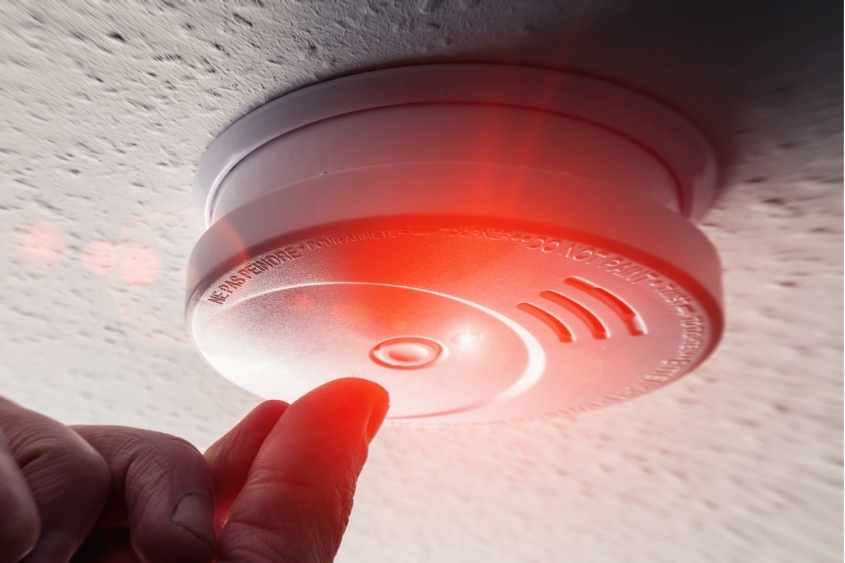
Understanding Body Corporate Disclosure Statements
In Queensland, the law mandates that sellers of lots in community title schemes provide a disclosure statement to prospective buyers before entering into a contract.

Home » Legislation » Smoke alarm changes – Top 10 things to know
Smoke alarm laws changed for Queensland residential properties in 2017. The change in the law was to upgrade the minimum number, type and placement of smoke alarms in residential properties.
This change was based on extensive evidence that improving smoke alarms in residential properties saves lives.
This change impacts every owner of a residential property, including:
| All new smoke alarms must meet stricter standards |
From 1 January 2017, all smoke alarms installed into residential properties must be:
1. Photoelectric 2. Interconnected with others in the dwelling 3. Hard-wired, or powered by a 10-year non-replaceable battery |
| The old-fashioned smoke alarm is now illegal |
From 1 January 2017, it became illegal to install: - Ionisation smoke alarms (inferior technology) - Battery-powered alarms where the battery is removable (like the old 9-volt square battery) - Alarms that are not interconnected with others in the dwelling |
| Every dwelling in Queensland must upgrade |
The new legislation applies to all residential dwellings in Queensland, including owner-occupied houses, units, townhouses.
Rental properties must be upgraded earlier, by 1 January 2022. Properties for sale must be upgraded before the time of sale. Owner-occupier properties must be fully compliant by 1 January 2027, noting that if your 10-year alarm expiry comes earlier than that date, you must upgrade earlier. If you renovate, you must upgrade at the time of renovation. |
| Compliant smoke alarms are more expensive |
Old illegal smoke alarms are still for sale, and range between $10-$40 each. These may be used in non-residential applications but cannot be installed into residential dwellings. New compliant smoke alarms which are wirelessly interconnected generally cost between $80-$120 each plus installation. |
| Interconnection can be done wirelessly |
Interconnection means if one alarm in your dwelling is activated, all other alarms in your dwelling will also activate. New retro-fit smoke alarms can be interconnected wirelessly. You buy as many as you need for your dwelling and then pair them together. If you are replacing existing battery-only alarms with new alarms, this can be a DIY job, or you can have them professionally installed by an electrician or smoke alarm specialist. |
| Most dwellings need more alarms |
There are new rules about alarm placement, and an alarm must be installed: - On each storey - In each bedroom - In hallways that connect bedrooms to the rest of the dwelling - If there is no hallway, between the bedrooms and other parts of the storey If there are no bedrooms on a storey, in the rooms in the most likely path of travel to exit (e.g. living rooms, dining rooms etc) In most units and townhouses, a smoke alarm will be required in almost every room, plus in each hallway. |
| Hard-wired must stay hard-wired when replaced |
If your dwelling has existing hard-wired smoke alarms, they can only be replaced with new hard-wired alarms. You cannot replace a hard-wired alarm with a battery-only alarm. |
| Strict 10-year replacement rule |
All smoke alarms expire 10 years after manufacture (not installation) and must be replaced with the new standard. If your property was built before 2012, check all your smoke alarms as they will need to be replaced and upgraded (if not done already). The manufacture date should be printed on the alarm or on a sticker on the alarm. |
| This law applies to apartment buildings too |
Whilst the body corporate may maintain a more advanced fire fighting system in units and common areas (e.g. fire sprinklers), owners are still responsible for their own interconnected smoke alarms within their own apartment. Owners in apartment buildings must: - Comply with their body corporate’s fire detection system requirements; AND - Ensure that they individually comply with this new interconnected smoke alarm requirement for their own apartment/unit. Generally, larger apartment buildings have systems to detect smoke once it enters the common property hallways, which triggers a full-building alarm and evacuation. If you are unsure about requirements for your own apartment or unit in a building with fire sprinklers or an advanced fire fighting system (fire panel), contact your building manager or BCsystems. |
| Landlord and tenant installation and testing obligations continue |
The standard of the alarms has increased, but the testing requirements also continue. Landlords should ensure that you or your property manager are managing your smoke alarm testing obligations very carefully. |

In Queensland, the law mandates that sellers of lots in community title schemes provide a disclosure statement to prospective buyers before entering into a contract.

Understanding how your individual levy amount is calculated can help you appreciate where your money goes and ensure transparency in the management of your community. Here’s a breakdown of the aspects involved in calculating levy amounts.